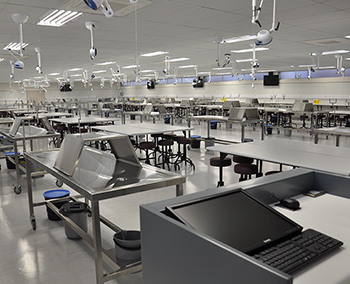Latest News Archive
Please select Category, Year, and then Month to display items
09 March 2022
|
Story Dr Cornelius Hagenmeier
 Internationalisation professionals attending the Dialogue on Innovative Higher Education Strategies National Multiplication Training workshop at the UFS.
Internationalisation professionals attending the Dialogue on Innovative Higher Education Strategies National Multiplication Training workshop at the UFS.
Dr Segun Obadire (Univen) and
Dr Cornelius Hagenmeier (UFS), who serve as directors responsible for the international offices at their universities, are part of the training committee. The theme of the training programme is ‘Enabling Internationalisation in Light of the 2020 Policy Framework for Internationalisation of Higher Education in South Africa 2022’; it comprises two training workshops and several virtual engagements. The first training workshop was held at the UFS from 1 to 3 March 2022.
Trendsetters
Mrs Nontlanhla Ntakana and Mr Matome Mokoena are alumni of the biannual DAAD DIES Training Course on Management of Internationalisation (MOI) at the
Leibniz University Hannover in Germany. They seized the opportunity to forge a multiplication training that would impact internationalisation leaders and managers from across South Africa and empower them to leverage the 2020 Policy Framework for Internationalisation of Higher Education in South Africa to advance the internationalisation process at their institutions.
Internationalisation experts
Dr Nico Jooste and Mrs Merle Hodges served as external experts on the training committee. Both are internationally renowned experts in the field and former presidents of the
International Education Association of South Africa (IEASA). Mr Leolyn Jackson (Central University of Technology, CUT) and Prof Lynette Jacobs (UFS) also contributed to the first training workshop.
Structure
This programme commenced in February, with participants engaging in topical readings and submitting their first assignment. First, a virtual workshop introduced participants to the UNIVEN Moodle e-learning platform used for the course. The face-to-face workshop at the UFS will be followed by a second in-person training at the University of Venda in September 2022. Virtual workshops and support of the participants through a dedicated WhatsApp group and other mentorship programmes will ensure the continuity of the training between the face-to-face workshops. Participants who were unable to attend the UFS and UNIVEN workshops in person could participate via a virtual link, thus ensuring that no participant is left behind.
Participants
Twenty participants from eight public higher education institutions were selected by the training committee to participate in the training programme. Two participants from this year’s NMT cohort were also accepted into the DIES MOI course at the Leibniz University Hannover in Germany. They are
Prof Nontokozo Mashiya from the University of Zululand (Unizulu) and Mbali Mkhize from the
Mangosuthu University of Technology (MUT). Participants in the first workshop have indicated that they gained a lot from the numerous exercises and activities in the programme. They also mentioned that the programme would change the outlook of internationalisation at their universities in the future.
New modern dissection hall ensures optimal learning experience for medical students
2015-12-14

New Dissection Hall in the Francois Retief Building on the Bloemfontein Campus.
Photo: Stephen Collett
|
The School of Medicine in the Faculty of Health Sciences at the university opened its doors on 6 June 1969. Three years later, a dissection hall for anatomy training was added to the school. This year, because of the prospective growth in the number of medical students as well as in changing methods of teaching and training, a new modern Dissection Hall has been completed on the Bloemfontein Campus. This ensures that students receive an optimal learning experience during dissection tuition.
The Dissection Hall was built as a double-storey wing to the existing Francois Retief Building. Covering 733m², the new facility is on the first floor - the same level as the existing hall - to allow easy access between the two facilities. The ground floor, totalling 465m², houses various offices for 16 people.
The new hall has special lighting and modern equipment for the training of second-year medical students in dissection. The hall also has high-quality sound and computer equipment. A unique camera system allows students to follow dissection demonstrations on 10 screens in the hall. Dissection demonstrations are recorded, enabling lecturers to compile new visual aid material for teaching and learning.
The dissection programme for medical students is of critical importance, not only for acquiring anatomical knowledge, but also for developing critical skills in medical students.
The new hall is also used for clinical workshops and postgraduate teaching seminars, as well as workshops in orthopaedics (shoulder, hip, and knee), otorhinolaryngology, cardiothoracic surgery (valve and endoscopy), and anaesthesiology, among others.
Both present and future generations of medical students will benefit from this new world-class facility.